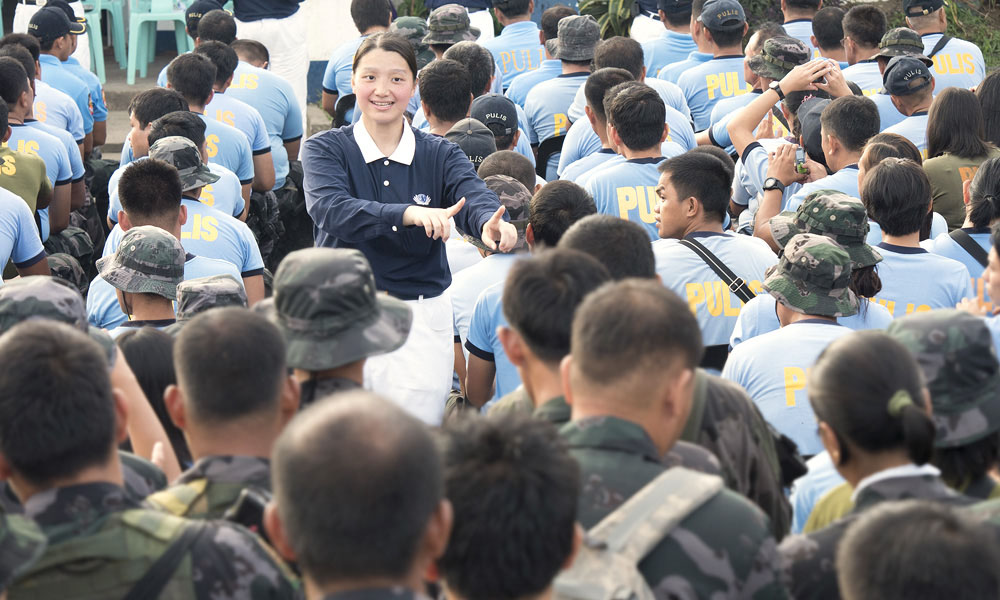
With meditative and still minds, they remain always in the state of Samadhi.
They are peaceful, content, uncontriving, and free from desires.
No delusions or discursive thoughts can affect them.”

Earth-shattering Disasters
On November 08, 2013, the devastating Typhoon Haiyan made landfall in the Philippines, claiming the lives of 7,000 people. Tacloban, a large city in central Philippines, was wiped out almost completely. There was even a rumor that the city would be abandoned.
Great saints of the Dharmakaya
Tzu Chi volunteers could not bear to let the disaster victims suffer. They rushed to the affected areas in their blue-and-white uniforms to begin relief work. Their selfless devotion was like that of compassionate Bodhisattvas, manifesting to help at every cry for aid and to embrace every victim of disaster.
The Sutra of Infinite Meanings
Under the guidance of Master Cheng Yen, Tzu Chi volunteers from all over the world rushed to the disaster area to begin assessments, aid distributions, fundraising, and medical care. Through their actions they manifested the spirit of "compassionate Bodhisattvas, great saints of the Dharmakaya" as described in the Chapter on Virtues in the Sutra of Infinite Meanings.
vows vast as the universe, they remain unwavering for countless kalpas.
Infinite Dharma-doors readily appear before them.
They attain great wisdom and completely understand all Dharma.”

Internally Cultivate Sincerity, Integrity, Faith and Steadfastness
Tzu Chi volunteers internally cultivate sincerity, integrity, faith and steadfastness and externally practice loving-kindness, compassion, joy and equanimity. Engaging in disaster relief efforts amidst tremendous suffering, they maintain the selflessness and purity of their hearts. Meanwhile, to carry out the disaster relief work, they had to adapt to the local needs and adopt the most direct, focused and respectful methods.
Externally Practice Loving-kindness, Compassion, Joy and Equanimity
Only with internal cultivation and external practice together can we achieve the greatest result within the shortest amount of time. Facing the devastating situation in Tacloban, Tzu Chi volunteers were determined to initiate "cash-for-work" relief programs to encourage the disaster victims to devote themselves to cleaning up their community. Only by helping themselves and others could they restore the vitality of their city.
Existent or non-existent, long or short, it is very clear and apparent to them.
With unhindered power of eloquence, they constantly turn the wheel of Dharma.
They first let fall drops of dew to immerse the dust of desire.”

The profound, subtle and wondrous Dharma is difficult to see and understand.
In the Chapter on Skillful Means, the Lotus Sutra speaks of "the profound, subtle and wondrous Dharma that is hard to see and understand." In the areas affected by Typhoon Haiyan, there were many things which needed to be done. But the amount distributed through the "cash-for-work" relief program, 500 Philippine pesos (PHP) per day, spurred controversies among non-governmental organizations who believed it was too high.
They comprehend and distinguish the nature and appearance of reality.
Tzu Chi volunteers explained that the 500 Philippine pesos (PHP) were relief distributions, not a salary. If the money was simply distributed to victims, the city would not recover. However, by using a "cash-for-work" program, not only would the city be revived, the economy around the disaster area would also recover quickly.
Existent or non-existent, long or short, it is very clear and apparent to them.
"Knowledge" refers to recognition, to knowing what something is when we see it. "Wisdom," on the other hand, is the ability to clearly distinguish the nature and appearance of everything. Money cannot be used to accomplish everything, yet if infinite love is added, money can manifest its wondrous uses to relieve disaster victims from suffering and help them attain joy.
The coolness of the Dharma is rained down upon ignorance.
They pour the stream of the Great Vehicle to nourish sentient beings.
They spread the seeds of goodness over the fields of merit.”

Amidst impermanence, afflictions flourish. Bodhisattvas use love to comfort those in need.
"Fanning the wind of liberation, they eliminate the fiery afflictions of the world. The coolness of the Dharma is rained down upon ignorance." Unifying practical and spiritual principles, in a short amount of time Tzu Chi volunteers led by example and motivated the survivors to work hard in cleaning up their hometown. As each day passed, the streets were gradually cleared and the neighborhood was gradually revived. The residents’ faces finally started to brighten up with smiles.
Blankets (thousands)
Tzu Chi instant rice (thousands)
Pre-fabricated Classrooms
Disaster relief kit/ (thousands)
They are the great field of blessings for all living beings.
They are the un-summoned teachers for all living beings.
They are the safe, stable and joyful refuge for all living beings.”

They are genuine, spiritual friends for all living beings.
Buddhist scriptures portray those Bodhisattvas who aid and deliver sentient beings from suffering as true spiritual friends and also a source of great support for sentient beings.
They are the great field of blessings for all living beings.
During the disaster relief efforts, Tzu Chi volunteers lived with the victims. They accompanied them through the aftermath of this merciless natural disaster and comforted them in their agony over losing their closest kin. The volunteers listened to their feelings of helplessness. They are truly great companions who provided victims with a spiritual resting place.
protection and great support for all living beings.
They are the great guiding teachers
for all sentient beings everywhere.
They serve as eyes for the blind and turn those who are confused,
in chaos and in panic toward Right Mindfulness.”

They turn those who are confused, in chaos and in panic toward Right Mindfulness.
After these Bodhisattvas entered the disaster area, they started to organize the victims, who were given cash for work for cleaning up their neighborhoods. The disaster victims, who were once helpless and hopeless after their homes were destroyed, responded to the call as if seeing a ray of light. Every morning they rushed to join the cleanup team, and every evening they would receive 500 Philippine pesos to provide for their family. Day after day, as they witnessed the recovery of their city, their hope for a new life was gradually reignited.
They know well the properties of medicine,
and dispense it according to the disease.
As great master boatmen, they carry all living beings
across the river of life and death to the shore of Nirvana.”

As medicine-kings and master boatmen they wholeheartedly safeguard the disaster victims.
Among the eight kinds of suffering, the suffering of illness is the worst. In the aftermath of the disaster, doctors in white coats rushed to the affected area and promptly gave medical assistance to the survivors. At the same time, they provided the survivors with spiritual consolation and care. Like medicine kings, "they know well the properties of medicine, dispense it according to the disease and lead people to take it joyfully." They are also just like master boatmen, who "carry all living beings across the river of life and death to the shore of Nirvana."
such as wealth, wife, children, and kingdom.
Never begrudging anything, internal or external,
His head, eyes, bone marrow, and brain were all given to others.
He upheld the pure precepts of all Buddhas.
Even at the cost of His life, he never caused harm.”

Leaving Home for the Sake of All Sentient Beings.
Every single Tzu Chi volunteer who went to the disaster areas did so on their own initiative and at their own expense, on personal leave time. Some of them even decided to purchase one-way tickets, vowing not to leave the disaster area until it had fully recovered. These volunteers left their families and jobs behind, and gave up their leisure time. Moreover, they put aside their own safety to wholeheartedly assist the victims through their hardship. They were truly able to "give up all that is hard to give up."
Even at the cost of His life, he never caused harm.
Even if someone hurt Him with knives or clubs,
or abused and insulted Him with words, He would never get angry.”

He upheld the pure precepts of all Buddhas.
When Tzu Chi volunteer entered the areas affected by Typhoon Haiyan, they strictly adhered to regulations and led by example. They devoted themselves to the cleanup of the neighborhood, which touched the local residents and inspired them to join in. Tzu Chi volunteers told Tacloban residents, "The international NGOs will eventually depart from this area. You must seize this opportunity to get involved and save yourselves. Only in this way can the vitality of your city be restored." The once doubtful local residents started to roll up their sleeves and take part in the cleanup efforts.
Even at the cost of His life, He never caused harm.
Other international NGOs were at first unable to understand the disaster relief methods employed by Tzu Chi Foundation. The daily minimum wage of local Filipinos was only 200 Philippine pesos. So why was Tzu Chi giving 500 Philippine pesos to victims who helped clean up the city? Tzu Chi volunteers replied, "The 500 Philippine pesos is an expression of our good wishes for them. Whether they help with the cleanup or not, we will provide them with it. However, if we only provide monetary aid, there is no way the city will recover quickly. Thus, we encourage residents to devote themselves to the city cleanup. Only by seizing the moment and enlisting more manpower can we bring hope to the disaster area!"
He never tired nor slackened.
Day and night, He focused His mind and remained in the state of meditation.
He extensively learned the Dharma of all paths.
His wisdom deeply penetrates the capacities of sentient beings.”

For many kalpas, though His body was worn down, He never tired nor slackened. Day and night, He focused His mind and remained in the state of meditation.
Regardless of the amount of time needed for disaster recovery, these Bodhisattvas vowed to accompany the survivors throughout the process. During the course of disaster relief, Tzu Chi volunteers remain firm and focused in their intent. In order to help sentient beings be freed from suffering and obtain happiness, they never tired nor slackened. They applied many different methods to guide sentient beings to save themselves and others. After nineteen days of hard work, the city of Tacloban was eventually revived. The local residents held a grand parade. The flag of Tzu Chi was waved as part of the procession.
They abide in the power of their vows and extensively purify Buddha-lands.”

Seize the moment to protect sentient beings, maintain your resolve to uphold compassionate vows forever.
Bodhisattvas form aspirations and maintain them without retreating. After they accompanied the local residents through the emergency phase, the vitality of the disaster area was gradually restored. As major roads were reconnected, residents were able to use the relief aid they had received to rebuild their homes. Tacloban was originally a gorgeous harbor city. After this disaster, everyone will surely cherish their peaceful life each day.


